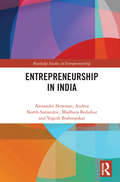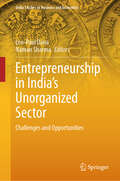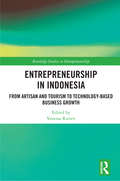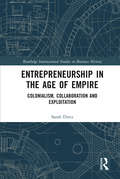- Table View
- List View
Entrepreneurship in Former Yugoslavia: Diversity, Institutional Constraints and Prospects
by Léo-Paul Dana Veland Ramadani Ramo PalalićThis volume offers a comprehensive state-of-the-art portrait of entrepreneurship and small business management issues in former Yugoslavian countries. Further, it provides a wealth of theoretical and empirical evidence on the role of entrepreneurship in transition economies and emerging markets. Country-based studies identify the processes in each country that attract financial investors and yield new business and employment opportunities. In addition, the studies highlight institutional constraints and political factors that hinder the development of entrepreneurship in these countries, and offer recommendations for policymakers on how to improve the general business environment. This book will appeal to entrepreneurship researchers, as well as public policymakers in transition economies and emerging markets.
Entrepreneurship in Healthcare (Routledge Studies in Health Management)
by Ralf Wilden Massimo Garbuio Federica Angeli Daniele MasciaEntrepreneurship in the Healthcare sector has received increased attention over the last two decades, both in terms of scholarly research and number of innovative enterprises. Entrepreneurial activities and innovations have emerged from and will continue to be driven by several actors along the healthcare value chain but especially from non-traditional healthcare players. In this new volume, we present the reader with several critical issues in healthcare entrepreneurship and innovation, covering a comprehensive set of research topics. We bring together the latest academic research and management practice, with contributions by authors from entrepreneurship, medical sciences, and management, who provide in depth and practical insights into designing and managing entrepreneurship in healthcare. Upon providing a systematic review of the research field, we discuss several important macro-, meso-, and micro-level issues in healthcare entrepreneurship, such as opportunity identification, the entrepreneurial ecosystem including accelerators, the benefits of open innovation for the sector, and social entrepreneurship in healthcare. These topics open up avenues for nurturing entrepreneurship in healthcare through both education and policy. Building on this trend, the book is organized around levels of analysis and specifies which cross-disciplinary efforts are needed to advance understanding of how entrepreneurs discover opportunities and start viable and innovative businesses. Healthcare Entrepreneurship will be of interest scholars of health care and entrepreneurs alike, but also managers of innovative health care enterprises as well as policy makers in the health sector.
Entrepreneurship in India
by Deependra SharmaThis book introduces readers and students to the entrepreneurial process. It is important as evidence has suggested that the probability of entrepreneurs’ success enhances when they thoroughly appreciate the components of the entrepreneurial process as well as how to effectively use them. The fact that nearly 33 percent of new firms fail within the first two years while twenty percent fail within four to five years of their existence makes it evident that while many people are highly motivated to start new firms, motivation alone is not sufficient, rather it should be coupled with relevant information, a strong business idea, a well-crafted business plan, and sound execution to maximize chances for success. This work offers an insightful and a practical guide to the process of launching and growing an entrepreneurial organisation with success. It will therefore serve as an important resource to students of Entreprenuership and to anyone interested in the field, academically or practically.
Entrepreneurship in India (Routledge Studies in Entrepreneurship)
by Andrea North-Samardzic Alexander Newman Madhura Bedarkar Yogesh BrahmankarThe economic liberalization in India over the last three decades has provided a wealth of opportunity for entrepreneurs looking to start and expand their businesses. Since the economy opened up in the 1990s, entrepreneurial activity in the private sector has been largely responsible for the strong economic growth experienced in the country. India is presently the world’s third largest source of start-ups, and was ranked the second most entrepreneurial country in the world in the recent Global Entrepreneurship Monitor (GEM) report, ahead of large economic powerhouses such as the United States, China and the UK. Entrepreneurship in India looks at the dynamic and changing nature of entrepreneurship in India. The book examines the history of entrepreneurship in India, different entrepreneurship models adopted, the entrepreneurial ecosystem and looks at the future of entrepreneurship in the country. This book will benefit businesspeople, policy makers and researchers looking to understand more about entrepreneurship in India, and offers guidance to foreign businesses looking to engage with entrepreneurs in India.
Entrepreneurship in India's Unorganized Sector: Challenges and Opportunities (India Studies in Business and Economics)
by Leo-Paul Dana Naman SharmaThis book offers a comprehensive examination of entrepreneurship in India's unorganized sector, shedding light on the hidden opportunities and challenges that exist within this vibrant and dynamic part of the economy. Drawing on interdisciplinary insights from entrepreneurship studies, development studies, small businesses and economics, this book provides a deep understanding of the entrepreneurial landscape in the Indian context and explores strategies for empowering entrepreneurs in the unorganized sector. Through case studies, interviews, and data analysis, it uncovers the distinct characteristics, resource constraints, and unique challenges faced by entrepreneurs in this sector, while also showcasing their innovation, resilience, and contributions to the economy. This book serves as a valuable resource for researchers interested in driving inclusive and sustainable entrepreneurship in India's unorganizedsector.
Entrepreneurship in Indonesia: From Artisan and Tourism to Technology-based Business Growth (Routledge Studies in Entrepreneurship)
by Vanessa RattenWhilst other countries in Asia particularly China and India have been studied in terms of entrepreneurial endeavors, there is a lack of research on Indonesia despite it being amongst the fastest growing economies in the world. Indonesia is also one of the largest recipients of venture capital in Asia. This book looks at the growth of entrepreneurship in Indonesia from artisan and cultural endeavors to an increased awareness of digital and technology-based forms of entrepreneurship. The book examines the distinct cultural heritage of people in Indonesia towards entrepreneurial pursuits and analyses the role family and minority businesses play in the development of entrepreneurial capabilities. It stresses the need to focus on more categories of entrepreneurship in Indonesia such as artisan, tourism and sustainability in order to facilitate the growth of digital based startups. This book will be amongst the first to explore how Indonesia is leaping ahead of competitors in its quest to be a dominant world power through its entrepreneurial pursuits.
Entrepreneurship in Korea: From Chaebols to Start-ups
by Martin Hemmert Jae-Jin KimEntrepreneurship in Korea offers a fresh perspective on entrepreneurship in Korea by combining a historical review of the achievements of Korean entrepreneurs at each stage of economic development with an analysis of the activities of current entrepreneurs who are at the forefront of the new Korean age. It discusses the crucial role of business entrepreneurship in each stage of Korea’s transformation from an underdeveloped East Asian backwater to a global manufacturing and technology powerhouse throughout the last 100 years. Furthermore, it provides an up-to-date analysis of contemporary start-up entrepreneurship in Korea and discusses its unique characteristics, strengths and weaknesses. Authors identify specific features of entrepreneurship in Korea, why and how business entrepreneurs have been so successful and effective, how their entrepreneurial styles and activities have changed over time, which challenges Korean start-up entrepreneurs are currently facing, and how these challenges may be addressed.
Entrepreneurship in Latin America
by Eduardo Lora Francesca CastellaniThis book looks at both the potential and limits of policies to promote entrepreneurship as an important vehicle for social mobility in Latin America and the Caribbean. Who are the region's entrepreneurs? They tend to be middle-aged males with secondary and, often, tertiary education who represent only a small segment of the economically-active population in the six countries considered in this book. They come from families in which a parent is, or was, an entrepreneur. In fact, a parent's occupation is more important in the decision to become an entrepreneur than a parent's wealth, income or education. Middle class entrepreneurship tends to dominate the sample in part since this is the majority class in society. However, as a percentage of each social class, entrepreneurship tends to be higher in the upper class, followed by the middle and lower classes. Entrepreneurs concentrate in micro-enterprises with fewer than five employees. They enjoy greater social mobility than employees and the self-employed, but this mobility is not always in the upward direction. Entrepreneurs face multiple obstacles including stifling bureaucracy, burdensome tax procedures, and lack of financing, human capital, technological skills, and supportive networks. The support of family and friends, and a modicum of social capital, help them cope with these obstacles to entrepreneurship.
Entrepreneurship in Post-Communist Countries: New Drivers Towards A Market Economy
by Jovo Ateljević Jelena BudakThis volume analyzes the barriers to, as well as new drivers for, entrepreneurial development in post-communist countries. The contributors present various country studies, mainly in the Balkans region, and investigate entrepreneurial behavior and best practices, financial instruments, factors for the success of small and medium-sized companies, and related policy implications. The book will appeal to scholars, policymakers and professionals interested in entrepreneurial obstacles and challenges in the countries of the Balkans region.
Entrepreneurship in Regional Communities: Exploring the Relevance of Embeddedness, Networking, Empowerment and Communitarian Values
by Sujana Adapa Alison Sheridan Subba Reddy YarramFocusing on nascent firms, established growing firms and established plateaued forms within the northern inland New South Wales regional locations in Australia, this book explores the manifestation of entrepreneurship. In particular, the authors examine the state and status of regional entrepreneurship in the bioregions and investigate how gender plays out in the entrepreneurial space. The authors present a detailed macro environmental framework, national and international literature syntheses and the differences between regional and urban businesses exploring the secondary data. Through interviews and primary data gathering, the authors explore the context in which the businesses operate and showcase the uniqueness of regional embeddedness, place-based initiatives, networking opportunities and communitarian values. Insightful reading for anyone interested in the facets regional entrepreneurship and gender studies, this book provides important implications for academic scholars, government officials, business practitioners, financial institutions, and other stakeholders who are involved in effective formulation of innovative business growth strategies.
Entrepreneurship in Renewable Energy Technologies
by Manoj Kumar GhosalThis book focusses on various options of taking up ventures for starting entrepreneurship in small/large scale in the field of renewable energy technologies. The book covers the fundamentals of entrepreneurship, renewable energy resources, their technologies involved and applications along with financial evaluations. The book will cater to the needs of students, researchers, various stakeholders, entrepreneurs etc. by providing valuable information on renewable energy technologies and their applications in developing entrepreneurship and establishing enterprise at individual level, specifically focusing on low carbon technology for sustenance of environment which is becoming increasingly important.
Entrepreneurship in Small Island States and Territories (Routledge Studies in Entrepreneurship)
by Godfrey BaldacchinoEntrepreneurship in Small Island States and Territories is the first publication to consider the ‘creative’ side of enterprise in small island states and territories. Rather than playing out as remote, vulnerable and dependent backwaters of neo-colonialism, the world’s small island states and territories (with resident populations of less than 1 million) show considerable resourcefulness in facing up to the very real challenges of their predicament. The creative endeavours of their residents, facilitated by adroit public policy, has created economic and investment opportunities that translate into some private sector employment and decent livelihoods for many. Their ingenuity, coupled with strategic investments and the support of the diaspora, has led to a suite of (sometimes unlikely) products and services: from citizenship and higher-level internet domain names, to place-branded foods and beverages; from electronic gaming to niche manufacturing. There is much more to small island survival than subsistence farming, aid, remittances and public sector workfare. Entrepreneurship in Small Island States and Territories helps to dispel this myth, showcasing an aspect of life in small island states and territories that is rarely documented or critically reviewed.
Entrepreneurship in South America: Context, Diversity, Constraints, Opportunities and Prospects (Springer Texts in Business and Economics)
by Léo-Paul Dana Veland Ramadani Christian KeenThis book reveals a variety of issues facing entrepreneurs, SMEs, and entrepreneurship development across South America. The authors recognize that when it comes to entrepreneurship, not one size fits all. Therefore, this book has been designed to help business students understand the context of the enterprise. It highlights how countries differ in their scope of entrepreneurship, and how entrepreneurs are impacted by these differences. Each chapter is dedicated to a respective country and describes the status quo, challenges and prospects for entrepreneurship there. Specifically, the book helps students understand the nature of entrepreneurship in Argentina, Bolivia, Chile, Colombia, Ecuador, French Guiana, Guyana, Paraguay, Peru, Surinam, Uruguay and Venezuela.
Entrepreneurship in Spain: A History (Routledge Studies in Entrepreneurship)
by Juan Manuel Matés-BarcoThe figure of the entrepreneur has become a relevant factor that explains the process of growth and economic development. Rising unemployment rates have generated among institutional and private agents, a significant interest in promoting entrepreneurship as a formula to eradicate this social scourge of unemployment. Active policies that favor business culture and initiative are being promoted in all areas. In the university world, academic research has multiplied the work on entrepreneurship, a term that includes a triple meaning: the figure of the entrepreneur, the business function and the creation of companies. This versatile meaning must be based on a consistent theory about the company and the entrepreneur. This book presents specific cases of companies and entrepreneurs that have had their role throughout the history of Spain. The intention is to show the techniques and learning acquired by those agents, which have allowed a considerable advance in the knowledge of the structure and business development. This book brings together the research carried out by its authors with primary sources and makes it accessible to a wide audience—Spanish and Latin American—and will be of value to researchers, academics, and students with an interest in Spanish entrepreneurship, business, and management history.
Entrepreneurship in Technology for ASEAN
by Purnendu Mandal John VongThis edited book focuses on growth and entrepreneurial development in rapidly developing countries in Asia-Pacific region. The book synthesizes the scholarly papers and ideas presented at the 3rd International Conference on Managing the Asian Century, Kuala Lumpur, Malaysia in 2015. It accounts for that fact that entrepreneurs of today are focusing more on technology and that this is happening in so-called Smart Nations. Chapters in the book elaborate on huge gains in innovation in ASEAN, China and India. Gains that are essential for national growth. Some of the issues that are covered include developments in Financial-Data Analysis, Global Healthcare, Geospatial Analysis, Lean Manufacturing, Human Resource, and Big Data and Learning Analytics.
Entrepreneurship in Tourism
by Andreas WalmsleyThis timely and innovative book is a theoretically underpinned yet accessible introduction to entrepreneurship in tourism.The volume takes an intuitive step-by-step approach through entrepreneurship in tourism: it begins with a review of key concepts in entrepreneurship and applies these to tourism; it then tackles the practical elements of the entrepreneurial process in tourism as well as firm growth with a specific focus on entrepreneurial marketing. The final chapters of the book take a more macro perspective at reviewing the place of entrepreneurship in society and how context shapes entrepreneurship in tourism.This second edition has been fully updated to include: A wider restructure of the original text, including the addition of chapters on the context of tourism, the addition of sustainable tourism entrepreneurship in a chapter on social and sustainable tourism entrepreneurship, alongside a chapter on the role of tourism in offering a pathway to empowerment New content covering key developments in entrepreneurship, including important topics that are only beginning to find their way into tourism literature. This includes themes such as: business models and business model innovation, crowdfunding in tourism, the role of AI and digitalisation in tourism marketing, sustainable tourism entrepreneurship, tourism entrepreneurial ecosystems, and the role of tourism entrepreneurship in supporting empowerment and poverty alleviation. These novel themes co-exist alongside material from the first edition that remains under-researched such as how tourism firms may maintain an entrepreneurial orientation and innovations in tourism employment Updated global case studies and examples from industry and academia throughout Each chapter offers an abstract, learning outcomes and a series of questions to stimulate critical engagement with the material covered. As such, the text offers an invaluable resource to tutors and their students on both undergraduate and postgraduate programmes in tourism, as well as tourism scholars engaging with the dynamic phenomenon of entrepreneurship in tourism.
Entrepreneurship in Transition Economies
by Arnis Sauka Alexander ChepurenkoThis book presents a state-of-the-art portrait of entrepreneurship in the transition economies of Central and Eastern Europe (CEE) and the Commonwealth of Independent States (CIS) as well as Georgia and Ukraine. Based on new empirical evidence, it highlights major trends in, characteristics and forms of entrepreneurship common to countries in transition. The contributions cover topics such as levels of opportunity-based entrepreneurship, incentives for innovation, dominance of large-scale international corporations, the role of family businesses, and opportunities for grass-roots entrepreneurship. The first part of the book focuses on theoretical considerations regarding the establishment of sustainable entrepreneurial ecosystems and private business. In turn, the second part offers cross-border studies of entrepreneurial environments and activities, while the third and fourth present case studies on the current state and unique characteristics of entrepreneurship in various countries of the CEE and CIS as well as Georgia and Ukraine. Finally, the last parts discuss the role of institutions and policy recommendations.
Entrepreneurship in Zeiten der Globalisierung und Digitalisierung: Für Startup-Gründer und solche, die es werden wollen
by Marc Helmold Tracy Dathe Isabel DatheDieses Buch unterstützt die Startup-Gründung mit vielen praxisbezogenen Erklärungen und Informationen. Eine Analyse der wesentlichen Trends, auch aufgrund der Digitalisierung und Globalisierung, hilft Gründern und solchen, die es werden wollen, um das Thema fundiert zu umfassen. Theoretische Elemente sind in der Buchstruktur enthalten und den Autoren gelingt damit eine Verbindung zwischen aktuellen akademischen Erkenntnissen und der unternehmerischen Geschäftspraxis. Für Startup-Unternehmer wie auch für den Einsatz zu Bildungszwecken im Hochschulbereich aufbereitet.
Entrepreneurship in a Changing Arctic: Siberian Reindeer Herders and the Northern Sea Route
by Sophus A. Reinert Anders Oskal Kjell Stokvik Quinn LewisCase
Entrepreneurship in a Global Context (Routledge Series In International Business And The World Economy Ser. #No.6)
by Sue Birley Ian C. MacMillanEmploying a multidisciplinary approach, the chapters cover all aspects of current entrepreneurship theory in multinational, economics, organizational sociology, marketing and finance. Other issues discussed include gender and networking, strategies in entrepreneurial growth, job satisfaction and franchising.
Entrepreneurship in a Regional Context (ISSN)
by Michael Fritsch and David J. StoreyEnterprise and entrepreneurship is of strong interest to policy-makers because new and small firms can be a key contributor to job and wealth creation. However this contribution varies spatially, with some areas in a country having new firm formation rates that are up to three or four times higher than others. The vast majority of these new firms begin in the geographical area in which the founder lives, works or was born emphasising that entrepreneurship is a local event. The book documents a diversity of research approaches to examining the regional determinants of entrepreneurship in countries as contrasting as India and Sweden. The Editors call is for scholars to better understand the long run factors that influence enterprise at the local and regional level. For policy makers the Editors challenge is for them to be much clearer about the targets for their policies. Is it new firms, new jobs, productivity and does it matter where these targets are delivered?This book was published as a special issue of Regional Studies.
Entrepreneurship in a Time of Social Justice Advocacy
by James O. FietThis book offers a critique of social justice theory and its impact on entrepreneurship scholarship. It traces its deep roots in postmodernism by positioning entrepreneurship within these new intellectual, social, and economic environments. It highlights current philosophical assumptions, with implications for boundary conditions that we apply as scientists. Science depends on theoretical assumptions and boundary conditions. Unfortunately, a glaring weakness in entrepreneurship research has been its general failure to identify these premises. No theory is universally applicable, so its assumptions and boundary conditions are what give it analytical power. Where do they come from? Simply stated, they come from a theory's philosophy of science. However, even more rare than stating assumptions and boundary conditions is to discuss a study's governing philosophy. In fact, no known research published in entrepreneurship has discussed a study's philosophical orientation. This provocative work details postmodern concerns related to critical theory, their origins, their status, and specifically how they impact entrepreneurship and those who are not designated as either the victimized or part of the white patriarchy. It will challenge the current direction of entrepreneurship research and confront the general acceptance of the tenets of postmodernism among management scholars.
Entrepreneurship in the Age of Empire: Colonialism, Collaboration and Exploitation (Routledge International Studies in Business History)
by Sarah DietzExploring the interplay of politics and commerce in one of the most dynamic periods of British history, this book traces the fortunes of the India and Eastern Trading Company Limited, established in 1906 to finance a jute plantation in Assam, north-east India. In a watershed period for commercial culture, as family capitalism and industrial economics gave way to a predominance of speculative investment and the marketing of ideas, analysis of this London-registered company and its international management forms a lens through which to view the broader socio-political and economic environment of the late-Victorian period to the interwar. Mapping the eclectic bonds that created a network of association between a multinational cast of merchants, company promoters, mining engineers, politicians and industrialists, reveals the multiplicity of strands which coalesced to create one share company. By examining their responses to the opportunities created by colonialism: to enabling legislations and set-backs, to competition and collaboration, internationalism versus rising nationalism, an important era in British history is examined from an entirely fresh perspective. The history of the India and Eastern Trading Company Limited is a tale of cloaked agendas, of land speculation under the guise of colonial agriculture, of German and Russian interests embedded in British-empire prospects, which exposes the intrigues of some of the most infamous imperialists of the era; figures who were the subject of intense academic scrutiny throughout the twentieth century and remain at the forefront of impassioned debate in the twenty first.
Entrepreneurship in the Arts (Discovering the Creative Industries)
by Bonita M. KolbThe need for artists, musicians, actors, singers, designers and other creative individuals to understand basic business concepts so they can successfully pursue their chosen creative profession has only grown since the publication of this textbook, now in its third edition. This popular book teaches business concepts in a way that is relevant to the way that creative students learn.Providing an understanding of the fundamental skills of entrepreneurship, this book enables creatives to launch new businesses, run for‑profit creative industries or manage nonprofit cultural organizations. The book leads the student through the entrepreneurial process starting with finding the right customers to pricing, distribution and promotion. This latest edition has been updated to account for significant changes in the creative industries that have been accelerated by the use of AI in the production of creative products, the challenge of pricing products within a range acceptable to consumers while accounting for the rising cost of production and the increasing need to use social listening skills and technology as a basis of consumer research.Weaving practical advice from successful creatives with pedagogical features such as "Questions to Consider," "Tasks to Complete" and "Visualization Exercises," this textbook continues to be essential reading for creative students.
Entrepreneurship in the Asia-Pacific: Case Studies
by Jing Wang Hua Bai Ke Xing Michitaka KosakaThis book is dedicated to the analysis of the entrepreneurship in successful companies by presenting and comparing a series of case studies in the Asia-Pacific where many new companies have been growing successfully in the 21th century. In total, 5 cases in the manufacturing industry, 4 cases in the services industry, and 3 cases related to new business and social innovation are chosen from The mainland of China, Taiwan, Japan, Australia, Malaysia and Vietnam. Each case provides insight into the entrepreneur’s aspiration, the processes of personal and business developments, the factors of success, and the inspirations drawn from the analysis. These cases are analyzed and compared from the viewpoints of entrepreneur’s motivation, ability of foreseeing changes and opportunities in the future business environment, core resources and innovation, knowledge management and culture for the company, determination and ethos. These are critical factors in value creation for customers and the society, especially in the future business environment. Finally, commonalities and uniquenesses in entrepreneurship relevant to industry sectors and social-economic-cultural contexts are clarified and a typical entrepreneurship model in the Asia-Pacific is proposed.
























